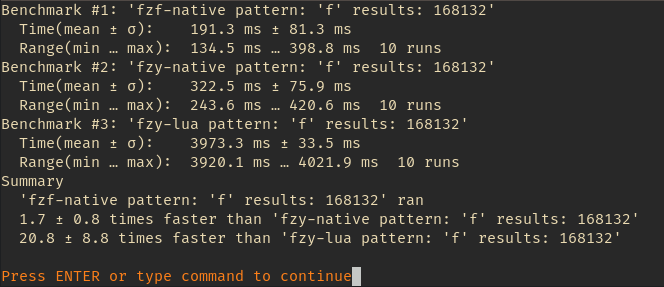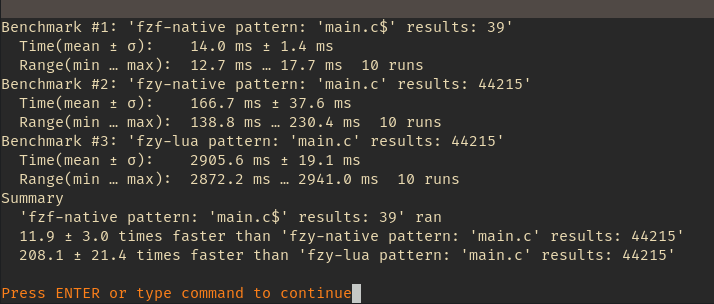AI prompts
base on FZF sorter for telescope written in c # telescope-fzf-native.nvim
**fzf-native** is a `c` port of **[fzf][fzf]**. It only covers the algorithm and
implements few functions to support calculating the score.
This means that the [fzf syntax](https://github.com/junegunn/fzf#search-syntax)
is supported:
| Token | Match type | Description |
| --------- | -------------------------- | ------------------------------------ |
| `sbtrkt` | fuzzy-match | Items that match `sbtrkt` |
| `'wild` | exact-match (quoted) | Items that include `wild` |
| `^music` | prefix-exact-match | Items that start with `music` |
| `.mp3$` | suffix-exact-match | Items that end with `.mp3` |
| `!fire` | inverse-exact-match | Items that do not include `fire` |
| `!^music` | inverse-prefix-exact-match | Items that do not start with `music` |
| `!.mp3$` | inverse-suffix-exact-match | Items that do not end with `.mp3` |
A single bar character term acts as an OR operator. For example, the following
query matches entries that start with `core` and end with either `go`, `rb`,
or `py`.
```
^core go$ | rb$ | py$
```
This is an advantage over the more simpler `fzy` algorithm, which is also
available for telescope (as native component or as lua component).
## Installation
To get **fzf-native** working, you need to build it with either `cmake` or `make`. As of now, we do not ship binaries.
Both install methods will be supported going forward.
### CMake (Windows, Linux, MacOS)
This requires:
- CMake, and the Microsoft C++ Build Tools on Windows
- CMake, make, and GCC or Clang on Linux and MacOS
#### vim-plug
```viml
Plug 'nvim-telescope/telescope-fzf-native.nvim', { 'do': 'cmake -S. -Bbuild -DCMAKE_BUILD_TYPE=Release && cmake --build build --config Release' }
```
#### packer.nvim
```lua
use { 'nvim-telescope/telescope-fzf-native.nvim', run = 'cmake -S. -Bbuild -DCMAKE_BUILD_TYPE=Release && cmake --build build --config Release' }
```
#### lazy.nvim
```lua
{ 'nvim-telescope/telescope-fzf-native.nvim', build = 'cmake -S. -Bbuild -DCMAKE_BUILD_TYPE=Release && cmake --build build --config Release' }
```
### Make (Linux, MacOS, Windows with MinGW)
This requires `gcc` or `clang` and `make`
#### vim-plug
```viml
Plug 'nvim-telescope/telescope-fzf-native.nvim', { 'do': 'make' }
```
#### packer.nvim
```lua
use { 'nvim-telescope/telescope-fzf-native.nvim', run = 'make' }
```
#### lazy.nvim
```lua
{ 'nvim-telescope/telescope-fzf-native.nvim', build = 'make' }
```
## Telescope Setup and Configuration
```lua
-- You dont need to set any of these options. These are the default ones. Only
-- the loading is important
require('telescope').setup {
extensions = {
fzf = {
fuzzy = true, -- false will only do exact matching
override_generic_sorter = true, -- override the generic sorter
override_file_sorter = true, -- override the file sorter
case_mode = "smart_case", -- or "ignore_case" or "respect_case"
-- the default case_mode is "smart_case"
}
}
}
-- To get fzf loaded and working with telescope, you need to call
-- load_extension, somewhere after setup function:
require('telescope').load_extension('fzf')
```
## Developer Interface
This section is only addressed towards developers who plan to use the library
(c or lua bindings).
This section is not addressed towards users of the telescope extension.
### C Interface
```c
fzf_slab_t *slab = fzf_make_default_slab();
/* fzf_case_mode enum : CaseSmart = 0, CaseIgnore, CaseRespect
* normalize bool : always set to false because its not implemented yet.
* This is reserved for future use
* pattern char* : pattern you want to match. e.g. "src | lua !.c$
* fuzzy bool : enable or disable fuzzy matching
*/
fzf_pattern_t *pattern = fzf_parse_pattern(CaseSmart, false, "src | lua !.c$", true);
/* you can get the score/position for as many items as you want */
int score = fzf_get_score(line, pattern, slab);
fzf_position_t *pos = fzf_get_positions(line, pattern, slab);
fzf_free_positions(pos);
fzf_free_pattern(pattern);
fzf_free_slab(slab);
```
### Lua Interface
```lua
local fzf = require('fzf_lib')
local slab = fzf.allocate_slab()
-- pattern: string
-- case_mode: number with 0 = smart_case, 1 = ignore_case, 2 = respect_case
-- fuzzy: enable or disable fuzzy matching. default true
local pattern_obj = fzf.parse_pattern(pattern, case_mode, fuzzy)
-- you can get the score/position for as many items as you want
-- line: string
-- score: number
local score = fzf.get_score(line, pattern_obj, slab)
-- table (does not have to be freed)
local pos = fzf.get_pos(line, pattern_obj, slab)
fzf.free_pattern(pattern_obj)
fzf.free_slab(slab)
```
## Disclaimer
This projects implements **[fzf][fzf]** algorithm in c. So there might be
differences in matching. I don't guarantee completeness.
### TODO
Stuff still missing that is present in **[fzf][fzf]**.
- [ ] normalize
- [ ] case for unicode (i don't think this works currently)
## Benchmark
Comparison with fzy-native and fzy-lua with a table containing 240201 file
strings. It calculated the score and position (if score > 0) for each of these
strings with the pattern that is listed below:


## Credit
All credit for the algorithm goes to junegunn and his work on **[fzf][fzf]**.
This is merely a c fork distributed under MIT for telescope.
[fzf]: https://github.com/junegunn/fzf
", Assign "at most 3 tags" to the expected json: {"id":"8270","tags":[]} "only from the tags list I provide: [{"id":77,"name":"3d"},{"id":89,"name":"agent"},{"id":17,"name":"ai"},{"id":54,"name":"algorithm"},{"id":24,"name":"api"},{"id":44,"name":"authentication"},{"id":3,"name":"aws"},{"id":27,"name":"backend"},{"id":60,"name":"benchmark"},{"id":72,"name":"best-practices"},{"id":39,"name":"bitcoin"},{"id":37,"name":"blockchain"},{"id":1,"name":"blog"},{"id":45,"name":"bundler"},{"id":58,"name":"cache"},{"id":21,"name":"chat"},{"id":49,"name":"cicd"},{"id":4,"name":"cli"},{"id":64,"name":"cloud-native"},{"id":48,"name":"cms"},{"id":61,"name":"compiler"},{"id":68,"name":"containerization"},{"id":92,"name":"crm"},{"id":34,"name":"data"},{"id":47,"name":"database"},{"id":8,"name":"declarative-gui "},{"id":9,"name":"deploy-tool"},{"id":53,"name":"desktop-app"},{"id":6,"name":"dev-exp-lib"},{"id":59,"name":"dev-tool"},{"id":13,"name":"ecommerce"},{"id":26,"name":"editor"},{"id":66,"name":"emulator"},{"id":62,"name":"filesystem"},{"id":80,"name":"finance"},{"id":15,"name":"firmware"},{"id":73,"name":"for-fun"},{"id":2,"name":"framework"},{"id":11,"name":"frontend"},{"id":22,"name":"game"},{"id":81,"name":"game-engine "},{"id":23,"name":"graphql"},{"id":84,"name":"gui"},{"id":91,"name":"http"},{"id":5,"name":"http-client"},{"id":51,"name":"iac"},{"id":30,"name":"ide"},{"id":78,"name":"iot"},{"id":40,"name":"json"},{"id":83,"name":"julian"},{"id":38,"name":"k8s"},{"id":31,"name":"language"},{"id":10,"name":"learning-resource"},{"id":33,"name":"lib"},{"id":41,"name":"linter"},{"id":28,"name":"lms"},{"id":16,"name":"logging"},{"id":76,"name":"low-code"},{"id":90,"name":"message-queue"},{"id":42,"name":"mobile-app"},{"id":18,"name":"monitoring"},{"id":36,"name":"networking"},{"id":7,"name":"node-version"},{"id":55,"name":"nosql"},{"id":57,"name":"observability"},{"id":46,"name":"orm"},{"id":52,"name":"os"},{"id":14,"name":"parser"},{"id":74,"name":"react"},{"id":82,"name":"real-time"},{"id":56,"name":"robot"},{"id":65,"name":"runtime"},{"id":32,"name":"sdk"},{"id":71,"name":"search"},{"id":63,"name":"secrets"},{"id":25,"name":"security"},{"id":85,"name":"server"},{"id":86,"name":"serverless"},{"id":70,"name":"storage"},{"id":75,"name":"system-design"},{"id":79,"name":"terminal"},{"id":29,"name":"testing"},{"id":12,"name":"ui"},{"id":50,"name":"ux"},{"id":88,"name":"video"},{"id":20,"name":"web-app"},{"id":35,"name":"web-server"},{"id":43,"name":"webassembly"},{"id":69,"name":"workflow"},{"id":87,"name":"yaml"}]" returns me the "expected json"